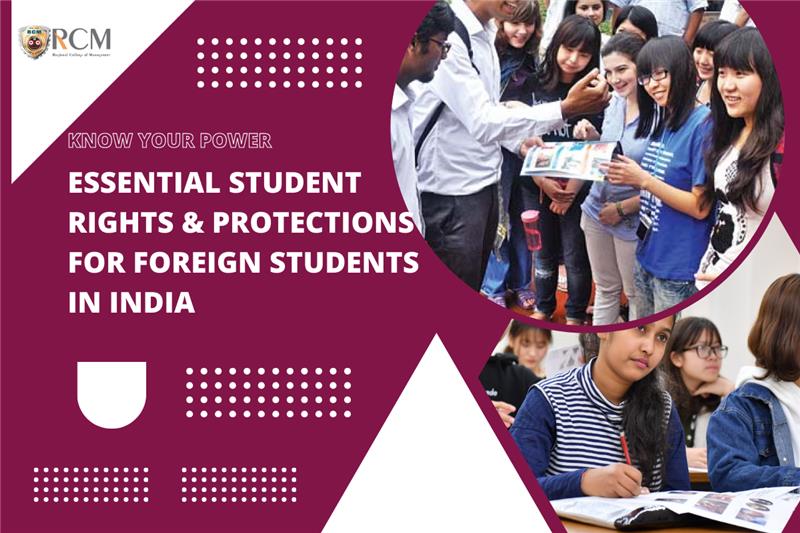A progressive society rests on the foundation of education, and students are its driving force. However, many students remain unaware of their student rights in India, leaving them vulnerable to exploitation. While the term ‘student rights’ is not explicitly defined in education laws in India, the Indian Constitution provides several legal safeguards that protect students in academic institutions. Understanding these legal rights of students is essential to ensure fair treatment, access to education, and protection from discrimination.
Foreign students studying in India also enjoy specific rights and protections under Indian law, governed by student visa rules in India. These provisions help them navigate their academic journey without legal complications. This article explores student rights in India, legal safeguards for students, and how foreign students can ensure compliance with Indian regulations.
Legal Rights of Students in India
- Right to Equality (Article 14)
The legal rights of students begin with the fundamental right to equality. As per Article 14 of the Indian Constitution, all students appearing for entrance exams should be treated equally, with no discrimination based on caste, creed, sex, personal beliefs, or religion. Institutions must ensure a level playing field for all students. - Right to Freedom of Speech and Expression (Article 19(2))
Every student has the right to voice their opinions freely under education laws in India. However, this right comes with responsibilities. While students can express their views on academic and social matters, they cannot misuse this privilege to defame their institution. It is important to note that private universities retain the right to take disciplinary action if students violate institutional policies. - Right to Information (Article 19(1)(a))
The right to information empowers students to seek relevant details about their academic progress, institution policies, and administrative decisions. No teacher or administrator can deny students access to information related to their education, except in cases concerning national security. - Right to Life and Personal Liberty (Article 21)
This right ensures that every student is entitled to an education in a safe and dignified environment. Physical punishment, mental harassment, or any form of discrimination is prohibited under student rights in India. The Delhi High Court ruled in 1973 that corporal punishment should be banned, reinforcing the importance of protecting students’ dignity. - Right to Education (Article 21A)
Education is a fundamental right for all children aged 6-14 under the Right to Education Act, of 2009. This law mandates free and compulsory education in government-aided schools. Moreover, private schools must allocate 25% of their seats to students from economically weaker sections, ensuring inclusiveness in education.
Protections for Foreign Students in India
Foreign students play a crucial role in India’s diverse academic ecosystem. To study in India, international students must comply with student visa rules India. Here are some essential rights and guidelines for foreign students:
- Student Visa Regulations
- Foreign students must obtain a valid Student Visa before arriving in India.
- The visa is issued for up to five years or the course duration, whichever is shorter.
- Students cannot convert a tourist visa into a student visa while in India.
- Registration with FRRO
Foreign students with a visa exceeding 180 days must register with the Foreigners Regional Registration Office (FRRO) within 14 days of arrival. This step ensures legal compliance and facilitates smooth academic tenure. - Course and Institution Change
A foreign student can change their course or institution, provided they obtain approval from the FRRO. This flexibility allows students to explore better educational opportunities in India. - Visa Extension
Students can extend their visas if required, but they must submit the necessary documents to the FRRO for approval. Adhering to student visa rules India prevents legal complications.
UGC Guidelines for Student Safety and Security
To ensure a safe learning environment, the University Grants Commission (UGC) has mandated safety measures for all educational institutions:
- Campus Security Measures
- Secure boundary walls and manned entry points with CCTV surveillance.
- Identity verification and bag checks at campus entry.
- Female security personnel at entry points for enhanced safety.
- Attendance & Monitoring
- Implementation of biometric attendance systems to track students’ movements and prevent proxy attendance.
- Real-time monitoring of student presence in hostels and classrooms.
- Anti-Discrimination Policies
- Institutions must enforce zero tolerance towards discrimination based on caste, religion, nationality, gender, or sexual orientation.
- Supportive counseling systems should be placed for students dealing with stress, anxiety, or academic pressure.
- Sexual Harassment Prevention
- Regular workshops and awareness programs to educate students about gender-based violence.
- Universities must collaborate with student groups to address safety concerns effectively.
- Emergency Medical Support
- Institutions should provide on-campus medical facilities and ambulance services for emergencies.
- Online complaint registration systems must be available for quick redressal of grievances.
Conclusion
Understanding and exercising student rights in India is essential for both domestic and international students. These rights safeguard students from discrimination, provide equal academic opportunities, and ensure a dignified learning environment. Foreign students must also adhere to student visa rules India to avoid legal hurdles. With stronger enforcement of education laws in India, students can focus on learning and personal growth without fear of injustice.
As students, knowing your rights is the first step toward empowering yourself and creating a more inclusive, fair, and secure academic environment. Stay informed, stay empowered!




















